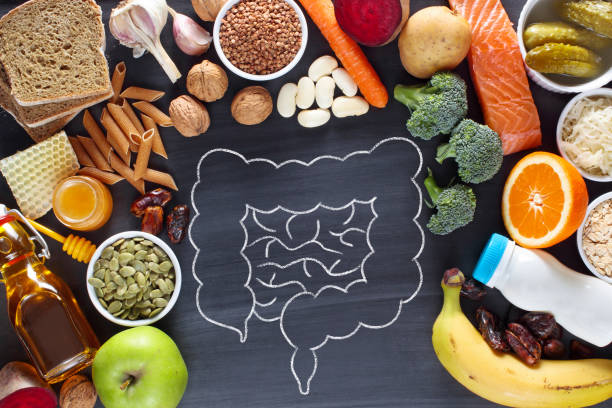Your body contains more than 40 trillion bacteria, yeasts, and viruses. Most of which are found in your intestines. They are collectively referred to as your gut micro biota or gut flora; many are advantageous—some are even necessary.
Therefore, it is in our best interests to care for these tiny creatures to keep the proper balance for optimum health and vigor, according to the best gut health nutritionist in Bangalore.
Having Exceptional Gut Health Benefits You in the Following Ways:
- Regular bowel movement
- Helps controlling weight
- Reduces bloating
- Improved energy
- Healthy and clear skin
- Enhances mood
- Boosts Immunity
- Improved digestion
- Nutrients are better absorbed
- Reduces Inflammation
Let’s look at nine simple yet evidence-based steps to enhance your gut health and put you on the path to a happy, healthy life.
9 Easy Ways to Improve Gut Health!
- Consume a Wide Variety of Foods:1.
In your gut, there are hundreds of different types of bacteria, and each one has a unique impact on your health. A healthy micro biome is diverse.
This variety of bacteria needs a broad mixture of nutrients to be produced and supported to survive and flourish. Numerous foods made from plants include these nutrients.
Unfortunately, there aren’t many plant-based foods in the typical western diet, which makes it even harder to feed our gut flora to build it up and make it resilient.
A diversified gut micro biota is produced by consuming a diet that contains a wide range of fiber, carbohydrates, and other nutrients.
The gut nutritionist says always to look out to eat at least 30 different plant-based food items and keep track of your gut’s performance.
- Consume Prebiotic Food:
Prebiotics, a class of non-digestible carbohydrates, provide food for the good bacteria in your stomach. They prefer eating it because it promotes growth and makes them more resilient to unfavorable changes.
Include prebiotic-rich foods like whole grains, asparagus, garlic, onions, and bananas and your daily serving of Gut Performance.
- Reduced Tension:
Your immune system is compromised, and inflammation increases by long-term physical, psychological, and environmental stress.
Stress affects how well nutrients are absorbed and weakens the intestinal barrier.
Consider using meditation, deep breathing, exercise, or even progressive muscle relaxation to counteract stress and lower the stress hormone cortisol. According to the gut health nutritionist, stress is the enemy of intestinal health.
- Consume Fermented Food:
The best probiotic supplements are pricey; instead, you can consume fermented foods, which are a natural source of probiotics, to increase the number of good bacteria in your body.
The quantity of inflammation- and chronic disease-causing bacteria, Enterobacteriaceae, is reduced by the presence of bifid bacteria and lactobacilli, which are abundant in fermented foods.
Consuming fermented foods like kimchee or sauerkraut can replenish your good bacteria. Take into consideration downing a shot of your preferred kombucha. However, remember that most commercial products contain sugar, so avoid overindulging.
- Limit Your Sugar Intake:
An unbalanced population of gut microorganisms results from eating a lot of sugar or artificial sweeteners. This ultimately hurts our brain, body, and behavior. Heart disease and several metabolic illnesses are associated with it.
You can refrain partially. Eat some dark chocolate and berries, please. Avoid processed foods because they cause the mass destruction of beneficial microorganisms and feed dangerous ones.
- Exercise Regularly:
We are all aware of the positive effects of exercise, but did you know that it also enhances gut health by increasing microbial diversity, which is crucial for optimum health.
The ideal diet and exercise regimen for maintaining a healthy gut is varied and nutrient-rich. Together, the two form a productive team.
Take advantage of exercise. Keep moving as and when you get time. According to gut nutritionists, a proper combination of exercise and the right choice of food will help you maintain good gut health.
- Make Sleep a Priority:
Your gut flora suffers adverse effects from irregular sleep, which can raise your chance of developing inflammatory diseases.
Your mood, mental acuity, and digestive health improve when you get excellent, restorative sleep.
Create healthy sleeping patterns. A few hours before night, turn off those electronics, keep your room cold and dark, and simultaneously rise and shine each day.
Avoid using your phone before the time of your sleep. Make it a habit to turn off the phone one hour before sleeping. This way, your mind will relax, and you can sleep well.
- Consume Foods Full of Polyphenols:
Plant substances called polyphenols diminish oxidative stress and inflammation in the body.
This results in a healthier heart and a lower risk of developing chronic illnesses.
Red wine, grape skins, blueberries, green tea, and dark chocolate are all excellent sources of polyphenols.
Coffee and tea include plant components called polyphenols that boost the number of good bacteria that guard the stomach lining, says the gut health nutritionist.
- Eat more Fish in your Diet:
Gut nutritionists believe that individuals who regularly consume salmon or cod have higher levels of good fats, a more diverse gut micro biome, and a decreased prevalence of gut bacteria known as Bacteroidetes.
Conclusion:
Our overall health is greatly influenced by the diversity and balance of the bacteria in our gut, which aids in digestion, boosts our immune system, and helps us control our emotions. According to the gut health nutritionist in Bangalore, this is possible without supplements, fortified foods, or micro biome tests




